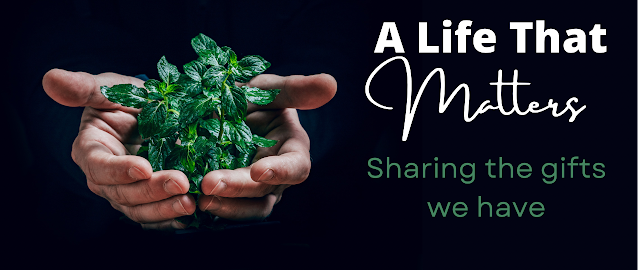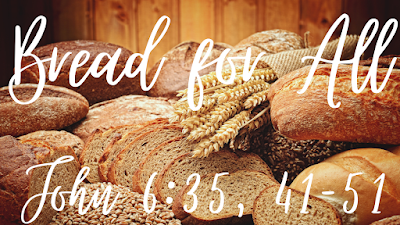The Fear of Home - Luke 3:1-6 (Advent 2C)
Here we are, one week closer to Christmas. Hope you are starting your preparations well. Who is done with their shopping? For the first time in a long time, I think we are done, if not very close to being totally done with our preparations in our own home. Our tree is up, and decorated, even if our cat likes to nibble at the branches at the bottom. The outside lights are up, and we even have a spotlight for our garage that has various snowflake shapes in it. We were gifted it from my mother-in-law last year, and it ended up in the garage, but somehow got moved (let’s be honest, I was probably the culprit of that) and so it fell BEHIND some of the shelving, and behind a piece of plywood on the floor. Thankfully, Tadjena is amazingly thorough and relentless, so she was able to find it after looking for what feels like two weeks. So - yeah - we’ve gone through our to do list, and making sure it’s getting done, and with that comes a sense of peace. Are you one who really likes being able to check things off a list? Surprisingly, I am not. I probably should, since I really like making lists. But it’s the follow through that I have the most problem with.
Anyway - that’s not why you came to service today. We have our text today that Ken read this morning, and I didn’t realize there were so many of those names and places in there. Thank you for sticking with it. But here we meet John the Baptist. He’s got different ideas on preparing for the Christ child. John is forcing us to take a look at ourselves, both personally and institutionally. We are being challenged to welcome Jesus, not only as a guest, but as the Lord and Savior of all. We are more than a witness to Christmas and observer of the tradition, but the point is to welcome Christ into our hearts, and to transform into the manger itself, to receive the child to help grow in faith and love. We need to repent - which we will get into more next week - but the baptism that John is referring to is a baptism of submission to the will of God, to acknowledge and accept the Messiah.
Not everyone is ready to do that. Outside of this building, there are many people who are, at minimum, skeptical of what that means. There’s other stuff to do - make sure our to do lists are checked, our shopping lists are complete, and our house is in magazine perfect condition. We’ve got to move heaven and earth to make sure that we are going to “win Christmas” as if it’s a competition. Our “busy-ness” has less to do with preparing for the Messiah and the love of God than it does in putting us in a frenzy to make sure that our life is more put together than it was last year. We come to Christmas with regrets, with associations, with burdens we’ve carried over the last 12 months. While our culture tells us to work past it, if you can get that “perfect” present for the beloved relative, then none of that matters. John comes at us from a completely different angle - PREPARE THE WAY OF THE LORD.
Well - what does that mean?? John is making sure our focus is where it ought to be - on Jesus. How do we prepare this way then? If God is love, then aren’t we preparing the way of love? Are your preparations being done in love? Are you making space for love, grace, and repentance in your holiday?
We will be meeting with family and friends over the next few weeks, some of whom are Christian, and some of whom are not. Regardless of their faith tradition, how welcoming will we be? How much of that Christian hospitality will we be offering? Will those who we come in contact with us know our deep love for all of creation? Or will we be trying to change and convert those who disagree with us? Trying to “win one for the kingdom”, as if there’s some sort of eternal scoreboard. Or, even, will there be empty seats at the table because of broken relationships?
Let’s get into the text a bit - so the first section talks about all these leaders who get named, and we can narrow down somewhat when this is taking place. Scholars have it best at about 23 or 24 AD. But that really doesn’t matter, because as many of these kings and rulers can be placed in time and space, they are only set points. After he talks about the so-called important ones, Luke says, The word of God came to John, son of Zechariah, in the wilderness. The word of God came to WHO? WHERE??? That seems like the wrong place. Shouldn’t the word of God come to someone in a castle, or at least a temple, where they thought God was anyway? Nope. The word of God came to a guy in the wilderness, beyond the fringe of society. He ate locusts and wild honey. I don’t think this is a guy who was invited to Christmas dinner, or even if he was invited, he may not even show up, not knowing the formalities of eating a fancy meal, maybe even not knowing where the napkin goes or how to use utensils.
But let’s take a step back - it’s said that John the Baptist is the last prophet of the Old Testament. Well, what does that mean? The prophets in the Old Testament, namely the books including Daniel and the twelve after him, Hosea, Joel, Amos, Obadiah, Jonah, Micah, Nahum, Habakkuk, Zephaniah, Haggai, Zechariah, and Malachi. In the grand scheme of the whole story of the Bible, this is during the period after the Kingdom of Israel was divided into the Northern and Southern Kingdoms, and then both were taken over by Assyrians and Babylonians, respectively. The Northern Kingdom would never recover, and the Babylonian exile was ended when the Persians came and conquered over them. The Jewish people were allowed to return to their land, and more importantly, re-establish the temple and their faith practices.
Each book has its own nuance, but taken together, these prophets challenge Israel to build and maintain Godly practices in economic development, how government functions for the greater good, and working towards the service of the community. There’s a lot more to get into through the individual books, so I encourage you to read them.
So - where does the fear come in? Many people are hurting this season, whether for painful childhood memories, loss of loved ones - for many reasons; stuck in abusive or harmful relationships, maybe even not being able to fully be who they know God has created them to be. When we talk about families, let’s not forget about the communities that surround them as well. Individuals seemingly are easier to love than groups… But we need to be conscious of who we leave out, consciously or not? Who can we made feel welcome, not just in a caring way, but in a way that really gets new people involved, new ministries evolving. Do we have the openness to not only welcome who appear to be different, but to offer them seats at our tables, allow them to minister to whatever communities they are a part of, in the ways that they can connect.
The church (not necessarily this one) has had a bad reputation for not being friendly and open to new ideas, new practices and ministries. So, I understand that there is fear even among you all here, thinking how the church will change and how we will adapt. That’s kind of the point John has in the re-reading of the words of Isaiah: Prepare the way of the Lord. Valleys will be filled, every mountain and hill shall be made low. Does that mean that God wants to make us all the same? I don’t believe so. I think it means that in the Kingdom of Heaven there are no hierarchies of people, that we as creation are holy, just as God intended. Just like the text from Isaiah finishes, all flesh (no exceptions) SHALL see the salvation of God. Let no obstacle get in the way of Jesus coming to all.
It is time for us to open our hearts to those who Jesus said we are called to minister to, the poor and hungry, the needy, the broken-hearted and the weary. Let the widows come to Jesus, and the children. Let the fear of the other lead God to reveal who God is through those others. We may speak differently, worship differently, or love differently, but there is a home for everyone here at Bethany church, and we can minister to all who walk through our doors, not just the ones we invite, but those who come willingly.
In a few moments, we will be taking communion. Some see the church needing to protect itself against… someone or something which is disruptive. They build walls. Jesus gave us a table, and put himself on that table, and said for all to come - eat and drink - and you will hunger and thirst no more. There is enough in God. There is no boundaries that we can put on God that he cannot overcome. Anything else would leave a smaller God, who looks like us, when we are just reinforcing our own image. I want us to grow beyond that, to see God in all his glory, throughout the world, and throughout our community. Welcome all those who come to you, whether you are scared, they are scared, and know that everyone is loved in the eyes of our God. The fear of home may be real, but our home in Christ is freedom. May the peace of the Christ child find you this week, and take away your fear. Amen




Comments
Post a Comment